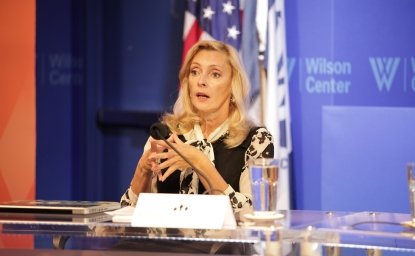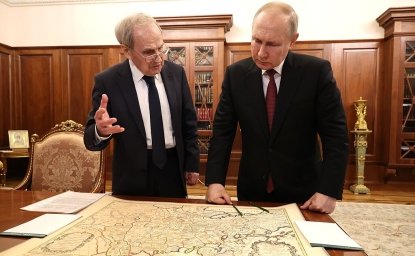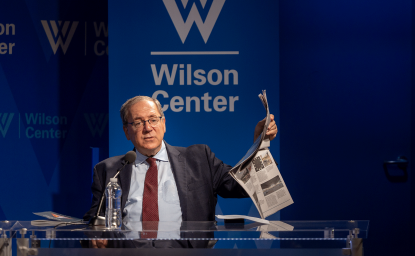The Trilateral Process: Washington, Kyiv, Moscow and the Removal of Soviet Nuclear Weapons from Ukraine

"When the Soviet Union collapsed, Ukraine had on its territory what was the third largest strategic nuclear arsenal in the world. It was larger than that of Britain, France, and China combined," said Steven Pifer, Visiting Fellow, Brookings Institution; Senior Advisor, Russian and Eurasia Program, Center for Strategic and International Studies; and former U.S. Ambassador to Ukraine at a 9 March 2009 lecture at the Kennan Institute. During the early 1990s, Washington, Kyiv, and Moscow engaged in a trilateral process to remove those weapons from Ukraine. The process was successful, Pifer contended, because "we were able to craft a win-win-win solution where the important objective for the United States and Russia, the elimination of nuclear arms on Ukrainian territory, was accomplished in a way that answered some key questions for the Ukrainians."
The Soviet collapse at the end of 1991 left strategic nuclear weapons on the territory of four countries: Russia, Ukraine, Belarus, and Kazakhstan. The U.S. goal at the time, according to Pifer, was to prevent an increase in the number of nuclear states. Connected with this goal was the status of the Strategic Arms Reduction Treaty (START) signed by the United States and the Soviet Union in 1991, which now had to take into account four newly independent states. The Lisbon Protocol, signed by the United States plus the four new states in May 1992, made all five states parties to START. Special conditions were attached to Ukraine, Belarus, and Kazakhstan under this protocol: they agreed to accede to the Non-Proliferation Treaty (NPT) as non-nuclear states as quickly as possible, and they agreed to eliminate strategic nuclear weapons from their territory within seven years.
While Ukraine was inclined to remove these nuclear weapons from its territory, it was not going to give them up for nothing. Pifer identified four main issues for Ukraine that arose during negotiations. First, possession of nuclear arms conveyed a definite security benefit, and Ukraine wanted security guarantees or assurances in return for surrendering them. Second, the nuclear material in the weapons had commercial value for which Ukraine wanted compensation. Third, the elimination of the silos, bombers, and other nuclear infrastructure would be very costly and require financial assistance. The fourth issue concerned how, where, and under what conditions the warheads and other material would be transferred or destroyed.
On the first issue, the United States was cautious that extending new security assurances to Ukraine might lead to pressure for extending similar ones to the rest of the post-Soviet states. The solution was to emphasize those security and territorial assurances already extended to non-nuclear signatories of the NPT and to signatories of the 1975 Helsinki Final Act. Pifer said that these assurances did not constitute new commitments by the United States, but "were packaged in a way that was politically important to Ukraine." On the question of compensation for the nuclear material in the strategic nuclear warheads, the Russians proposed to convert the material into fuel for Ukraine's nuclear power plants, and Ukraine accepted. On the third question, the United States provided Ukraine with assistance to eliminate nuclear systems and infrastructure. And, on the last issue, the three parties agreed that warheads would be transferred to Russia for elimination while missiles and bombers were eliminated in Ukraine.
By the summer of 1993, Pifer said, Russian-Ukrainian political tensions jeopardized two years of bilateral negotiation as well as the Lisbon Protocol. At that point, both Russia and Ukraine saw value in including the United States in negotiations: Russia viewed the United States as sharing Russia's goal of removing strategic nuclear weapons from Ukraine, and Ukraine believed its interests would receive greater attention with the United States at the table.
According to Pifer, U.S. involvement helped accelerate negotiations to produce diplomatic deliverables in time for a series of deadlines constructed around high-level meetings and summits, such as the signing of the Trilateral Statement by presidents Clinton, Yeltsin, and Kuchma in January 1994. U.S. funding through the Nunn-Lugar program provided $60 million to help the Russians kick-start the conversion of warhead material into nuclear fuel and $175 million to help Ukraine begin to eliminate the nuclear arms infrastructure, such as silos and bombers, on Ukrainian territory.
Finally, the negotiators from the three sides stressed pragmatic solutions to resolve complications. For example, Ukraine was scheduled to submit its instruments of accession to the NPT as a non-nuclear state and formally enter into START at the OSCE summit in Budapest in December 1994. The Rada resolution on accession to the NPT, however, was ambiguous as to whether Ukraine was acceding as a nuclear or non-nuclear state, which was unacceptable to the Russians. The compromise reached after intense negotiations was to attach a diplomatic note from the Ukrainian president to the Rada resolution stipulating that Ukraine was acceding as a non-nuclear state.
Pifer concluded that important lessons can be drawn from the trilateral process about the importance of pragmatism, high-stakes deadlines, and money. Whether the process can serve as a model in the future to address Russian-Ukrainian tensions is questionable, given the unique circumstances of the first experience. "These things aren't going to work unless you have all three parties seeing value [in them]; and the circumstances in which that might happen in the future are limited."
Author


Kennan Institute
The Kennan Institute is the premier US center for advanced research on Eurasia and the oldest and largest regional program at the Woodrow Wilson International Center for Scholars. The Kennan Institute is committed to improving American understanding of Russia, Ukraine, Central Asia, the South Caucasus, and the surrounding region though research and exchange. Read more

Explore More
Browse Insights & Analysis
Dr. Karina Korostelina: From Crimea to Global Peacemaking


